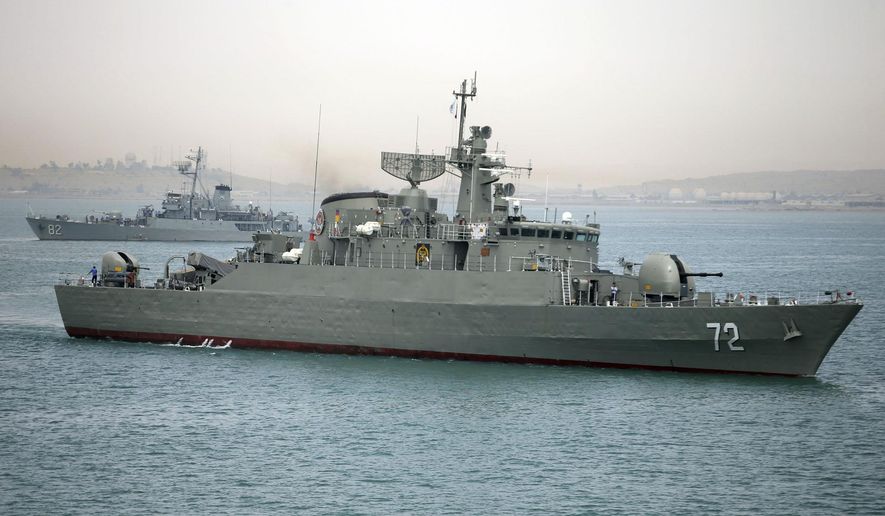Iranian naval forces fired at and seized a commercial cargo ship passing through the Strait of Hormuz on Tuesday, and legal experts say there’s very little the ship’s home country can do about it.
Members of the Islamic Revolutionary Guard Corps Navy, similar to an Iranian coast guard, boarded a Marshall Islands-flagged cargo vessel Tuesday morning after firing shots at the ship, prompting the U.S. military to send a ship and plane to the vessel’s defense.
The Pentagon said at least five Iranian patrol vessels approached the Maersk Tigris cargo ship as it was transiting the Straight of Hormuz and directed the ship to proceed further into Iranian waters.
When the ship’s master declined, an Iranian ship fired shots across the bridge of the cargo vessel, Pentagon spokesman Col. Steve Warren said. After shots were fired, the ship followed the direction to proceed into Iranian waters near the vicinity of Larak Island. It was boarded by members of the Iranian coast guard and is being held in Iranian waters with about 30 people onboard.
Col. Warren called it “inappropriate” for Iran to fire shots at the cargo ship.
Craig Allen, a professor of international and maritime law at the University of Washington, said a country would typically bring the country that detained a ship to an international court for violating rights of navigation under the 1982 United Nations Convention on the Laws of the Sea.
SEE ALSO: George W. Bush warns against lifting Iran sanctions
Because Iran never ratified that convention, however, the Marshall Islands has very little power to demand Iran release the cargo ship, Mr. Allen said.
“The options are very limited, especially for a country like the Marshall Islands,” he said. “You start taking counter-measures, something short of the use of force, like cutting off trade relations or trying to use economic muscle to push back against Iran to try to persuade them to release this vessel.”
Mr. Allen said it was unlikely the U.S. or Marshall Islands would use force against Iran and also said going to the U.N. Security Council probably wouldn’t help, since Russia could veto any punitive actions.
Fars, the Iranian state controlled media, reported that the cargo ship was seized under a court order for “long overdue payments” to Iran’s Ports and Maritime Organization. But Mr. Allen said that — even if true — there is “no chance” that could be used as a legitimate reason to shoot at and board a ship passing through an international strait.
“That’s a civil claim,” he said. “If that’s the only basis they had, that simply won’t fly.”
The Marshall Islands gained independence from the United States in 1986, but the U.S. continues to have “full authority and responsibility for security and defense of the Marshall Islands,” according to the State Department’s website.
SEE ALSO: White House: U.S. aircraft carrier sent to Yemen to protect commerce
Jeff Rathke, a State Department spokesman, said that in addition to America’s interest in maintaining open, safe shipping lanes, the U.S. also has “a particular relationship with the Republic of the Marshall Islands.”
But he added that it was unclear what obligation the U.S. had to provide defensive help to a Marshall Islands-flagged ship and said it was “premature” to talk about using force.
The Maersk Tigris issued a distress call, prompting U.S. Naval Forces Central Command to send the U.S. destroyer Farragut to the site as well as aircraft to observe the interaction, Col. Warren said.
There are no Americans aboard the cargo ship and currently no injuries reported among the crew, Col. Warren said.
The vessel, which was traveling from Jeddah, Saudi Arabia, to Jebel Ali, United Arab Emirates, is owned and crewed by Rickmers Ship Management, but being used by Maersk Line, according to a statement from the shipping company.
“Our paramount concern is the safety and well-being of the crew,” Maersk Line said in the statement. “We are working in close dialogue with Rickmers Ship Management to obtain information about the seizure and explore options to help resolve this situation.”
Last week, the U.S. aircraft carrier Theodore Roosevelt moved off the coast of Yemen in response to an Iranian flotilla of cargo ships heading there. The Iranian ships turned away from Yemen on Thursday and headed up the coast of Oman instead, leading the U.S. to move its assets back to the Persian Gulf.
• Jacqueline Klimas can be reached at jklimas@washingtontimes.com.




Please read our comment policy before commenting.